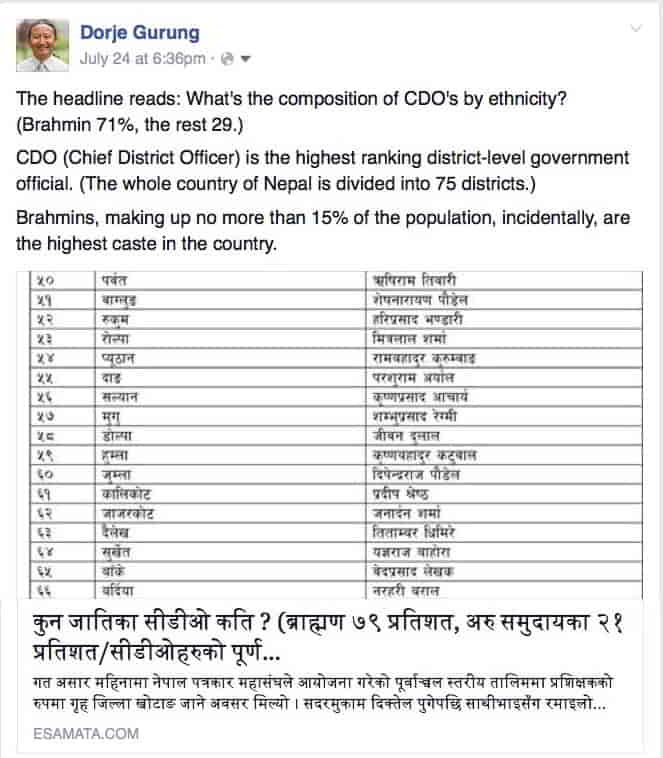
Structural inequality propped up, supported and perpetuated by Nepal’s very highly patriarchal caste system has given rise to a bureaucratic and political system that overwhelmingly provides–directly or indirectly–opportunities to a small political elite. The data above for instance is but only one example demonstrating that.
But discussing issues such as structural inequality and the caste system with fellow Nepalese is a real challenge. Partly because they avoid discussing thorny issues in general–it makes them very uncomfortable and/or they struggle with using logic and reasoning. Partly also because they are masters at deflecting such discussions.
There have been times when Nepalese I have conversations with have resorted to calling me names unable to counter my arguments about social inequity in Nepal. “Racist” is one of them! (We’ll ignore the fact that caste and race are not the same!)
Someone famous (can’t remember who, maybe Douglas Adams?) once said something along these lines, “When in a debate or discussion they personally attack you or label you, then you know they have lost it!”
But that’s lost on a lot of Nepalese I have had conversations with!
I am sure there are a number of other reasons–apart from those two–for Nepalese avoiding discussing thorny issues sitting around a table with beer in hand at a pleasant bar and restaurant or over a dinner table in a posh part of Kathmandu.
However, I have found a solution to the challenge they face with logic and reasoning. But, before I give you that, first a reproduction of the discussion which followed the above Facebook post to demonstrates what I mean.
A friend “G” starts off the discussion.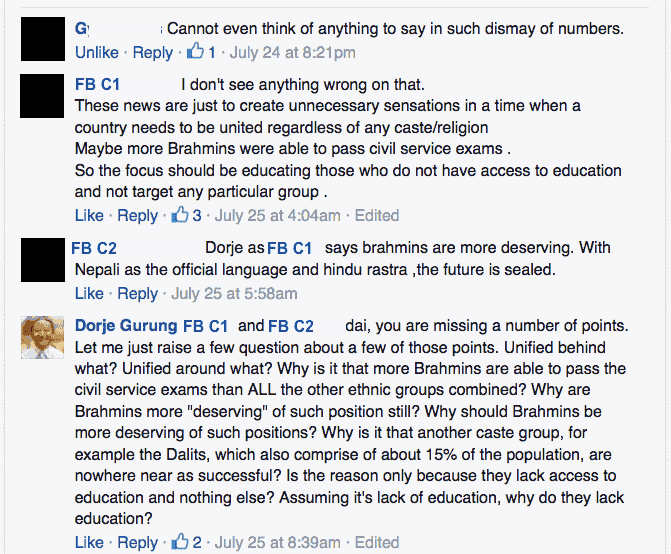
Notice how the contributor I have renamed FB C1 (“C” for Contributor), fails to see the significance of the statistics. (I’ll have more to say about statistics later.) As you can see, I tried to point that out in my own comment.
But here’s FBC1’s response where s/he makes no attempt to address the issues and instead tries to deflect the conversation.
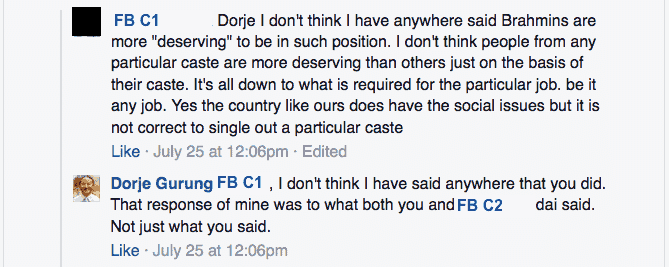
The following two new contributors–one (D) Nepali and the other (I) a European–however, hit the nail in the head!

But then a new Nepali contributor (labeled FB C3) makes a flawed argument to which I did my best to respond adequately by drawing his attention to privilege and social capital.
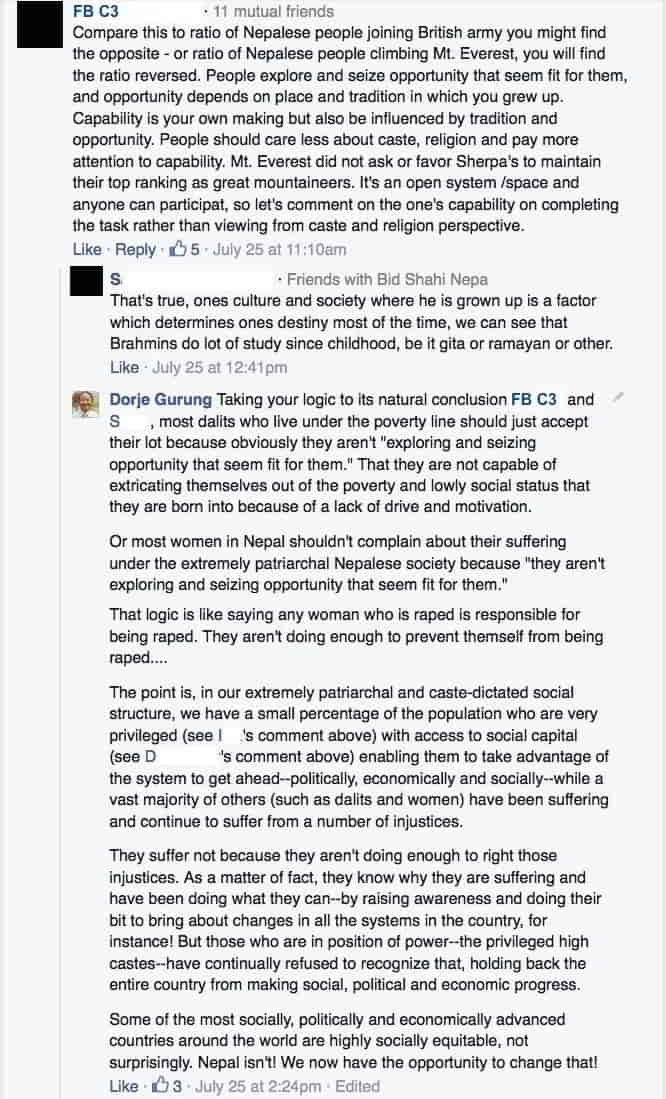
A foreign friend, who has spent more than a decade in Nepal and has learned a great deal about our social system, chimes in with this:
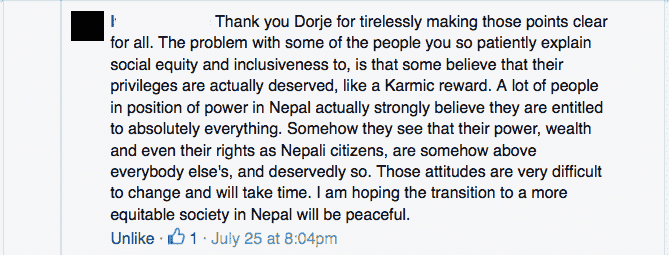
But, FB C3 comes back to continue the discussion! Except it’s clear that FBC3 has understood neither his/her own (flawed) argument/position nor my argument, and does not seem to have understood the meanings of privilege and social capital, etc.
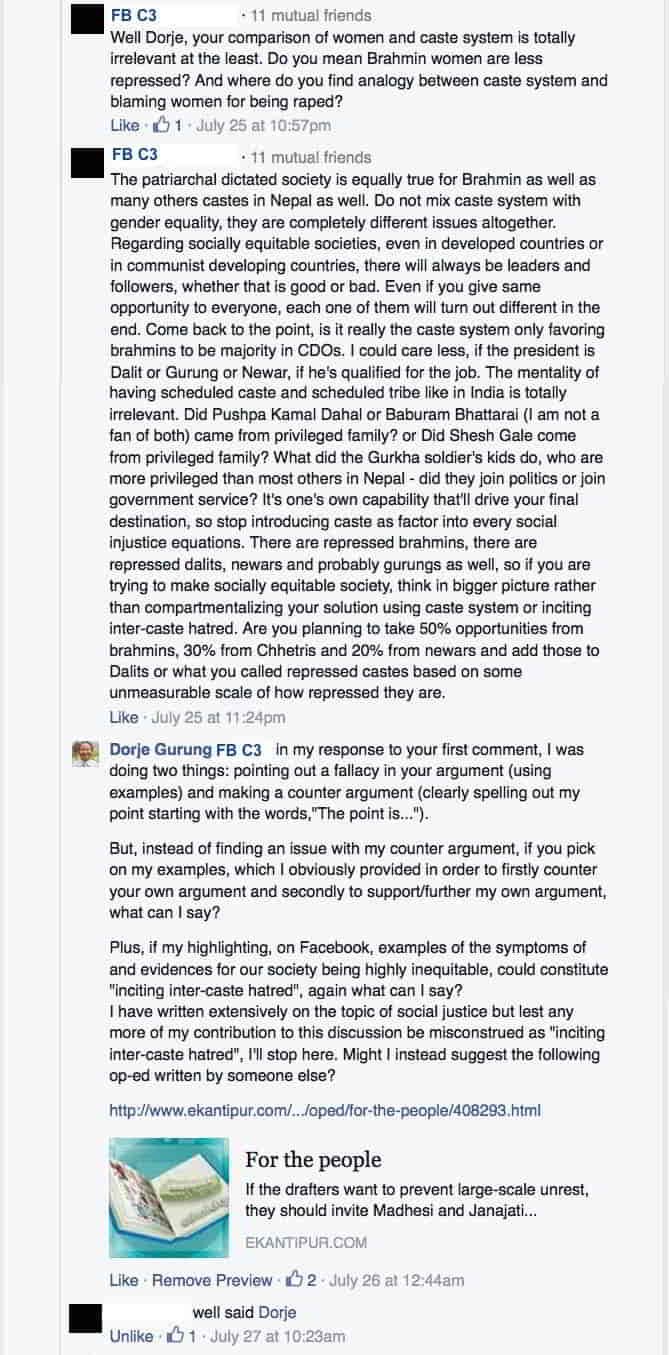
And yet another person (“I”) chimes in with the following propositions:
 Contributor “I” clearly, and sadly, has no clue about statistics!
Contributor “I” clearly, and sadly, has no clue about statistics!
The first proposition, linking statistics to racism, again doesn’t even deserve a commentary. (Yet another person who equates caste to race!)
And, not unlike the other contributors to this discussion, “I” obviously is oblivious to the fact that, if everything were equal, it’s statistically impossible for a group of people, the Brahmins/Bahuns, that comprises less than 15% of the population, to be so far “more laborious and hard working” than the rest of the population to succeed in occupying MOST positions of power.
(Prime Ministers of Nepal, for instance, are also overwhelmingly hill so-called high caste Hindus, even those that have presided over the country since 1990 when a democratic form of governance was introduced. As if most of them being from high caste wasn’t bad enough, a number of them served in the post multiple times!
To give you another example, sixty judges appointed last July, according to this article by Gyanu Adhikari, consisted of all high-caste men except for just seven, six of whom were indigenous people and only one a woman!)
Regardless, I posted a link to an article about a lesson demonstrating what privilege is. That didn’t help either!
The contributor FB C3, not surprisingly, completely missed the point of the lesson, the analgy. FB C3 rehashed his flawed argument, and went off on a tangent (to talk about pedagogy), bringing into question, again, his understanding of the issue.
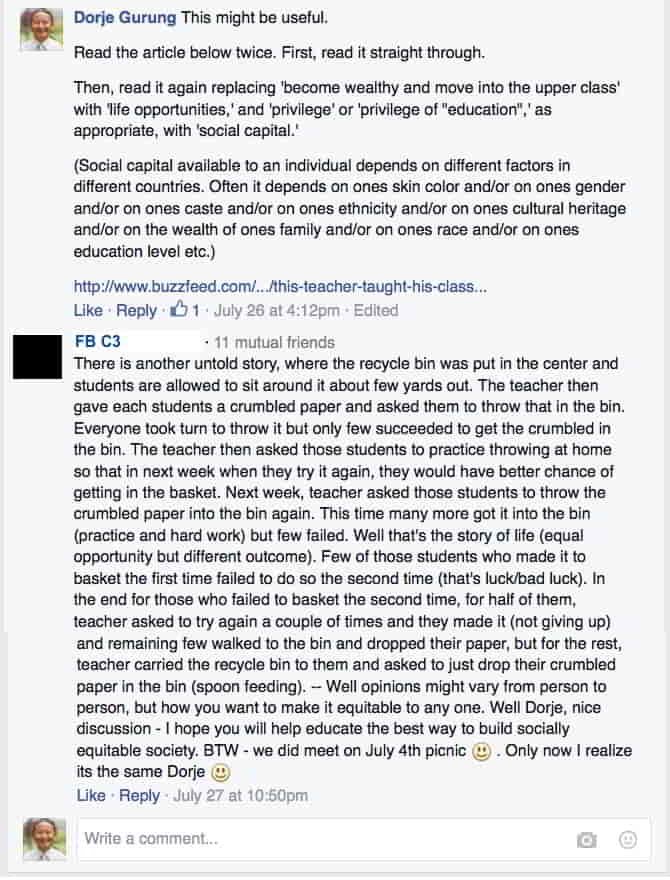
Of course, I did not continue the discussion, except to post a link to my most recent blog post about assessing privilege in Nepal.
As for the solution to the challenge Nepalese face, that of understanding and making logical arguments…
Being an educator, I have wondered for a long time why they struggle with that.
A little over a year ago, I decided that the solution may lie in teaching philosophy in Nepalese schools. 🙂
The study of philosophy accords a number of benefits. Here are three ways Nepalese will benefit.
Firstly, it imparts the ability to be objective, especially when expressing views and appraising others — their ideas, their feelings, their emotions, and their opinions. That may possibly even help develop empathy!
Secondly, it teaches students about logic, about making logical arguments and detecting fallacies.
Thirdly, philosophers, apparently, make the best statesmen! So, even if most of our statesmen continue to be hill so-called high caste Hindus, their studies of philosophy might make them just that much better at serving the people of Nepal, bringing about political, economic and social progress! 🙂
One can always hope!
* * * * * * * *
References:
Click here to go to the original Facebook post where all of the above exchange took place.
The composition of CDO’s. (This is in Nepali.) The articles describes how the vast majority of CDO’s are Brahmins.
Additional References:
The Examined life. A quote from the article: “[W]e need to remember something that Socrates drew our attention to long ago, but which in our eagerness to turn schools into engines of economic productivity we have forgotten, namely that education is a philosophical process. It begins with questioning, proceeds by enquiry, and moves in the direction of deeper understanding. The journey of enquiry is powered by critical reflection, discussion and debate. It leads not to final answers but to a greater appreciation of the limits of our knowledge, both of the world around us and of our own mysterious selves.”
And later, the article goes on to point out how teaching students to “think for themselves” will make them “more adept at interpreting questions and making the important transition from descriptive to argumentative and evaluative responses. In short, if students have learned to think better, they will be able to think better about what to do when the exams come around.
“Yet, despite the evident advantages of teaching students to think philosophically, the dominant mode of education remains staunchly traditional and of a particularly stultifying character.” (Both the emphases are mine.) [Added on October 17, 2016.]
Home Ministry reshuffles CDOs in 41 districts. A cursory glance at the names of the CDO’s revealed most of CDO’s to still be Bahuns/Brahmins. The online version of the article however contains photos of the paper listing the names of the CDO’s, and the names are all in Nepali. Click here to go to the page in the e-paper version of the publication for the names in English. (The article appears at the bottom left corner.) [Article published on April 27, 2018, and this references added to this blog post on the same day.]
White Privilege. The link is to a meme which says: “White privilege doesn’t mean your life hasn’t been hard; it means that your skin color isn’t one of the things making it harder.” Similarly, we can say this about Khas privilege.
“Khas privilege doesn’t mean your life hasn’t been hard; it means that your caste isn’t one of the things making it harder.”
[Added Nov. 30, 2018.]
Research Gate (Nov. 2015). The Ain of 1854 and after: Legal pluralism, models of society and ethnicity in Nepal. [Added on Nov. 30, 2018.]
Medium (Nov. 27, 2018). This ‘Equity’ picture is actually White Supremacy at work. “We’ve all seen this picture, right?
“In a picture-is-worth-1,000-words kind of way, this image simplifies the profound difference between equality and equity. From this picture people have actually begun to understand that treating everyone equally doesn’t lead to equity, and in fact, equal treatment often perpetuates and justifies racial hierarchies. Yes, this picture has taught us a lot.“ [Added on Nov. 30, 2018.]

Hi, Dorje. Thanks for all the work you put into this blog. It was very interesting reading. Whilst reading, I could not help but think of a BBC film I ran across a few days ago.
This documentary put Britain’s leaving of the European Union into a similar “caste system” light, giving me the impression that the upper castes of Great Britain have taken over the government and succeeded in manipulating the voting population to get their privileges back.
The film is interesting in its own right, but even more interesting, when you consider the comparison between the so-called “public schools” in Britain (which are nothing of the sort, but rather elitist institutions that cater to the upper class and the odd child of moneyed parents in the upper middle class) and the “grammar schools”, which are being closed in the name of equal opportunity and turned into comprehensive schools. The problem with that is that the grammar schools were able to give the “public schools” a real run for their money (and for decades after World War II, politicians they educated ran Great Britain). The comprehensive schools do not achieve that. When thinking about how to offer education and broaden access to political power, this aspect should be a real and serious consideration: A real meritocracy (such as the grammar schools fostered) can compete with the education the upper class schools offer. If, however, you seek to “equalize” this educational meritocracy, then you run the very real risk of ultimately conceding power to the already powerful.
Democratizing education is a Herculean task. On the one hand, you want to open up more opportunity to more students. On the other hand, the top levels of what you offer can only be accessible to those who are willing and able to do the massive hard work that goes into catching up with privilege. The top levels of government-funded education must match or even exceed the results of private education, if a democratization is to function and not be just a massive dumb-down that leads to cementing the leadership of the privileged few.
The film link: https://www.youtube.com/watch?v=tF7OJhG7J84
See what you think. Personally, I think we all have our caste problems – even if the “castes” in western nations don’t have names.